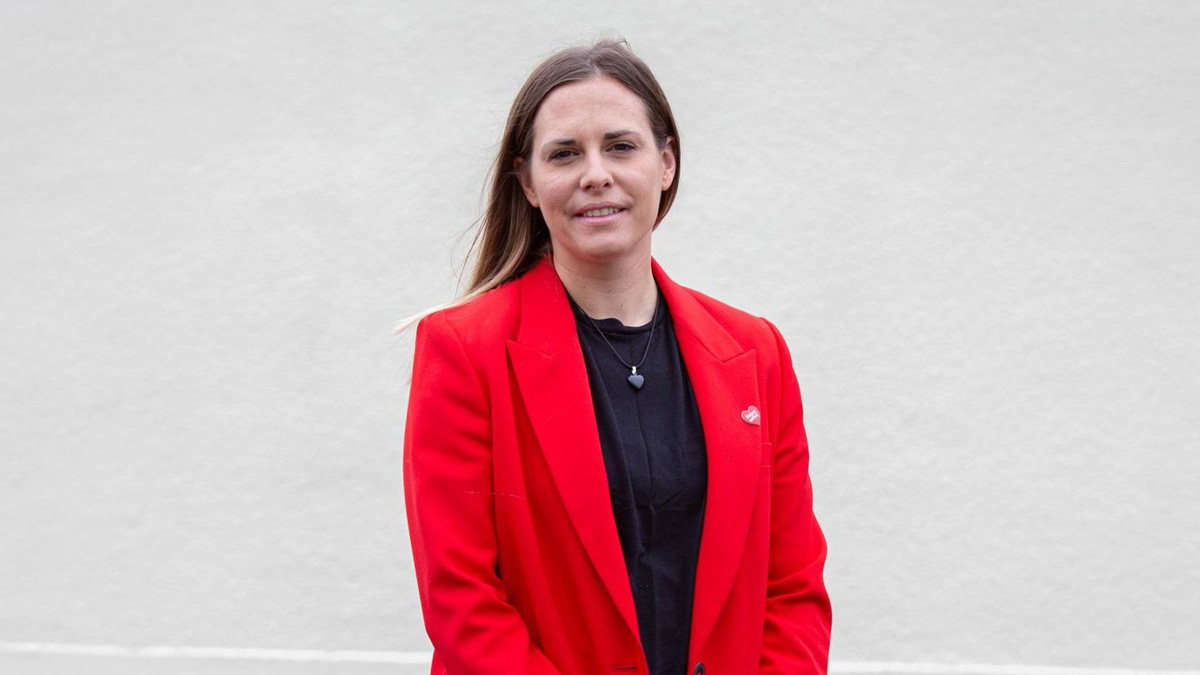In Conversation With… Anna Miles MBE
Authors: Neil Hardcastle, with Anna Miles.
30th June 2021.
Anna Miles works in Mayville’s SEN Department, as a Dyslexia & Dysgraphia Tutor, providing academic and emotional support to pupils with learning differences. She lives in Southsea, with her husband and two young daughters (both Mayville pupils). She was recently awarded an MBE in the Queen’s Birthday Honours List, in recognition of her work in founding The Red Box Project. We managed to grab twenty minutes, to learn more about her charity work and what inspires her to find the time to make a difference.
The Red Box Project was founded in 2017, as a direct action response to the problem of ‘period poverty’. How did you first become aware of the issue?
Early in March 2017, myself and two friends read a newspaper article about a group of young women who were consistently missing a week of school every month, due to having their period. Their school had reached out to community groups and charities, in the hope that they might receive support in providing free menstrual products. No such support existed at the time and we were shocked and, very quickly, became enraged that an issue of this kind existed in the UK, where young people were missing school, because they did not have access to the period products they needed.
We wanted to see if this was an isolated problem – we feared that this would not be the case – and so we decided to do some research, by contacting schools in the wider community of Portsmouth. It became clear that this was an issue that had been prevalent across our society for many, many years but that the stigma around talking about menstruation prevented young people from asking for the help they needed. We knew then that we had to do something and so, The Red Box Project was founded.
From fairly early on in the project, you recognised a nationwide need. How did you take steps to spread the message and reach outside of your local network?
We began initially by supporting a local school in the area, as well as youth clubs that had contacted us for support. I have always believed in the power of human kindness and I knew that this issue would not only anger us into action – it was something that people around the country would also be shocked to hear about. We set up Facebook and Instagram pages and, within two days, we had a number of women and men contact us, wishing to set up a Red Box Project in their local community. Over the next six months, the project had grown astronomically. We worked late into every night, contacting new volunteers and responding to the huge numbers of emails from schools and colleges, who were keen to bring The Red Box Project to their students.
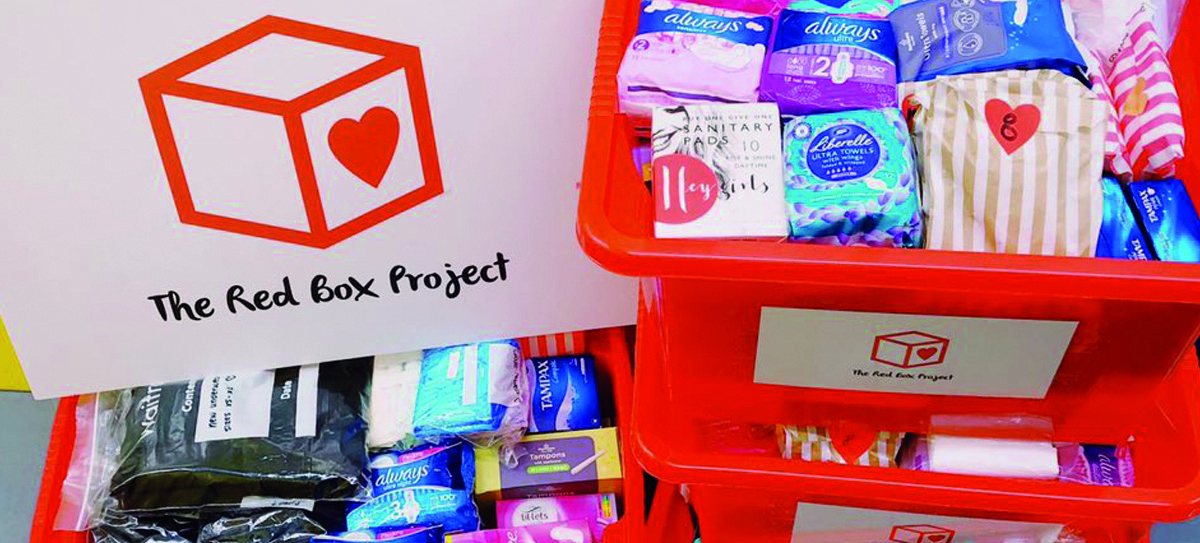
Within a short period of time, there were over 400 projects, up and down the country. How did you resource, fund and coordinate this rapid growth?
We designed a project that was accessible to anyone who wanted to volunteer. Time is our most precious commodity and, so often, people want to help fight a cause but the responsibilities they have in their lives might understandably prevent them from doing so. It was important to me that our project gave everyone the opportunity to help, if they wanted to. We designed a 'How to...' guide, which set out the format of setting-up a project and people could choose to support one local school or, as was the case in many of our projects, take on a huge area – seen successfully in Portsmouth, with our amazing volunteer coordinator, Rebecca. Logistically, this required an enormous overview of every movement our project made, in order that there was no overlapping. It was like a jigsaw and there was nothing more incredible than seeing how the project grew and, therefore, knowing that more and more young people were being supported.
The Red Box Project has always relied on the kindness of strangers. We worked only with donations. We provided projects with resources, such as posters, box labels and information sheets. These were given to school and college staff, to signpost the project for their students. All of the period products, underwear and tights were donated by the public – either through the setting up of donation drop-off points in supermarkets, libraries, shops, museums, etc or by corporate donations, from supporters such as Vogue, the London Mayor's Office, ASOS and The Body Shop. We designed donation drop-off posters that highlighted the work we were doing, along with our symbolic 'Red Boxes'. It was kindness in motion and people gave so generously.
As the project grew, we did not make any fundamental changes to how it functioned but, of course, it became impossible to ease up on the hours we put in. It required 24/7 focus, because the need was so great. I also felt passionately that every single email that was sent to us had to receive a response within 48 hours. When someone takes the time to email, particularly for support, it has to be given precedence.
Campaigning requires a very different approach to simply providing a response. How did you organise, to be able to challenge the problem on a political and legal level, whilst continuing to offer essential grassroots support?
I never wanted The Red Box Project to be a permanent solution to the problem. No young person should have barriers to receiving an education – it is a fundamental right. It was our firm belief that the inequality in the classroom was a problem that should be tackled and supported by our Government. As we watched the governments in Scotland and Wales provide free menstrual products within all state-maintained schools and colleges, we galvanized support, through our incredible volunteer coordinators and those in our wider community, to fight for the same change across England.
Our success in being able to bring a legal campaign to the Government was undoubtedly due to playing to the strengths of every single person on our team. We met with a legal team in London and collaborated with Free Periods, to bring the issue to the forefront. Together, we started to gain the support of many MP's, who backed our proposal and exerted pressure on the government to provide a scheme that would provide free period products to state-maintained schools and colleges in England. In the early part of 2020, the Government announced that it would provide funding to all state-maintained secondary schools across England. Whilst this was brilliant news, we felt strongly that primary schools should also be supported in the same way and so we made our case for this to be extended. Fortunately, the Government listened and the scheme was widened, to include them.
I never wanted The Red Box Project to be a permanent solution to the problem. No young person should have barriers to receiving an education – it is a fundamental right. It was our firm belief that the inequality in the classroom was a problem that should be tackled and supported by our Government.”
This has obviously had a profound impact, on a national level. Does this success mean that The Red Box Project is no longer required? Is the problem now ‘solved’?
The work of The Red Box Project is still required in many countries around the world. We have projects in Bangladesh, Hong Kong, USA, Poland, Africa, the Isle of Man, Japan, Jersey, Monaco, Moldova, Australia and Nigeria. Until we have equality in every classroom, globally, we will fight as hard as we can, to see the changes we have seen across the UK and in several other countries.
At home, support is also needed in youth clubs, where the Government's support has not been extended.
Recent reports in the media state that only 40% of eligible schools and colleges have signed-up to the Government’s scheme. Is there still work to be done in spreading the message?
COVID created a situation for schools and colleges that required them to, quite rightly, focus on a huge number of unexpected changes, not only in the way in which learning was delivered but in the pastoral care they continued to provide. We are currently planning an awareness campaign, to engage with those either working in schools or those connected to schools, to encourage all eligible educational settings to sign-up for the free period products that are available to their students.
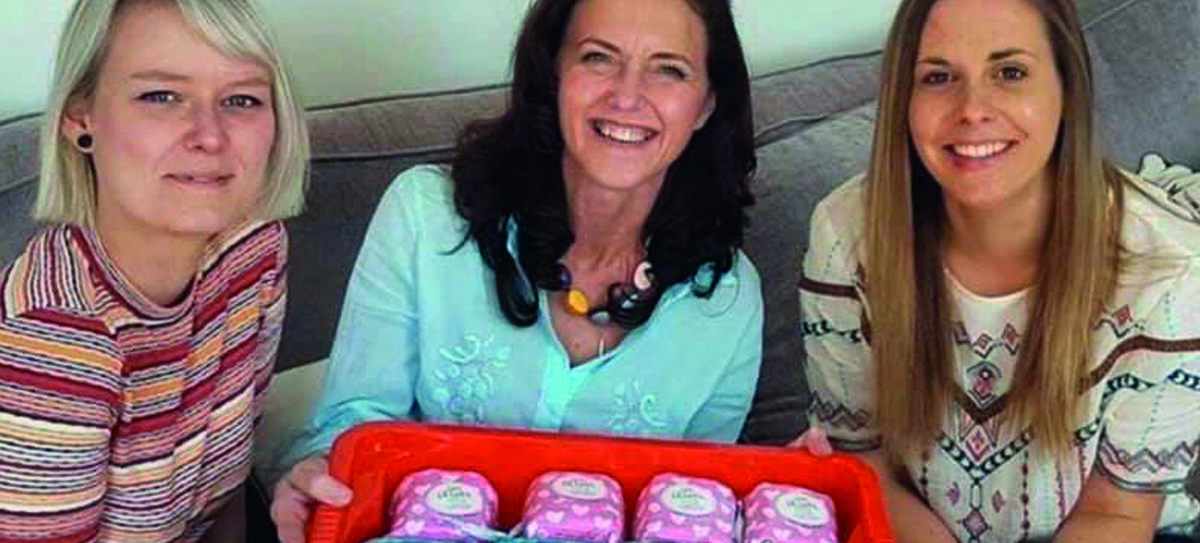
We were obviously thrilled to hear that your dedication and compassion has been acknowledged in the Queen’s Birthday Honours List. How did you feel, upon finding out the news?
When you commit yourself to a cause that you are passionate about – in my case, gender equality and access to education – I never considered that this would lead to being nominated for an MBE. I believe that where there is injustice in the world, the only way to deal with it is to do something proactive about it. When I received my MBE nomination, I had an out-of-body experience! It was an honour to be recognised in such a way and sharing the news with the wider team was a very special moment. Without our collective energies, the project would not be what it stands for today and nor would it be able to continue to support so many young people. It is a humbling experience and a moment that I will always remember.
In terms of the media, I have always shied away from being on TV and radio. It actually took a huge amount of courage to think that I needed to fight my fear. When the news was announced, I decided that it would be my chance to say thank you to everyone who has made and continues to make this such a special project to run.
The icing on the cake was being able to share the news with my family, friends and colleagues. The wave of love and support that I have received, since the news was shared, has been overwhelming, in the best possible way. I am a strong believer in supporting those around you and celebrating other people's successes – to have that bestowed upon me was heartwarming and I feel incredibly fortunate to have the best people in the world around me. My family, my husband and my two children made the announcement day one that I will never forget. Their pride in me means more than I can say. To see my daughters’ faces, when they watched me on the news, was a moment forged in my memory forevermore. Everything I do, I do for them. I want them to know that where they see an injustice in the world, they have it within their power to change it. I would also like to say thank you to the amazing young people I support in the DLEU. They inspire me every day and were so wonderful when the news was shared.
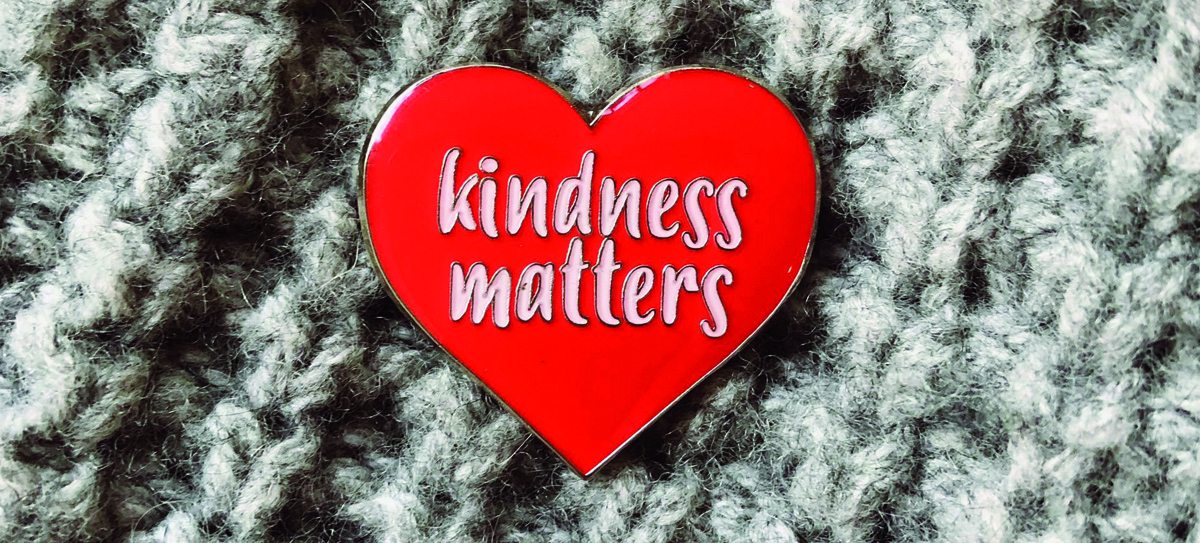
Obviously, you work at Mayville, providing educational and pastoral support in the SEN Department. You also have two young daughters. How do you find the time and energy to commit to a cause such as The Red Box Project?
When people ask me about how I juggle being a mother, work and charity work it feels difficult to answer, because it suggests I go above what others do, which is inaccurate. There is something inside me that makes doing something the only possible solution, when bearing witness to the many injustices there are around the world. I feel that my life is a privileged one. I have the freedom to speak, to travel, to educate myself as my children do too. I am loved and supported by my family and have the comfort of knowing I have a place to call home. It is luck of the draw, how you arrive on this planet and we have a duty to look outside of our own existence and to place ourselves in other people's shoes. Many millions of lives are affected by atrocities that are completely out of their control. They are innocent people who seek nothing but a life that we have been lucky to be born into. I feel driven by these thoughts. How do I manage the parts of my life that I hold dear? Sometimes to the detriment of my health! HAHA! Slowing down just isn't possible and I am motivated by wanting a better world for my children. Whilst there is beauty in the world, I cannot live in a society where we do not support and cherish one another. Volunteering enables others to give as much time as they can give – every act of kindness resonates and makes a difference.
You have also been instrumental in setting up Portsmouth Cares (Donations for Refugees). What can you tell us about this project?
I set up Portsmouth Cares, with colleagues and friends, in September 2020. It is a volunteer-driven, community group which focuses on supporting refugees, by collecting donations and sending them to where they are needed most. This is something that I feel is incredibly important work – work which feeds into the same principles and beliefs I had around supporting others through The Red Box Project. The people of Portsmouth have been a force – I always knew that this would be the case – and we were overwhelmed by the community’s generosity. Unfortunately, Brexit has made logistical planning for small community groups much more complex. However, we are determined to make it workable and I am now desperately seeking advice in finding a space where collections of donations can be stored – something that is proving more difficult than I first imagined.
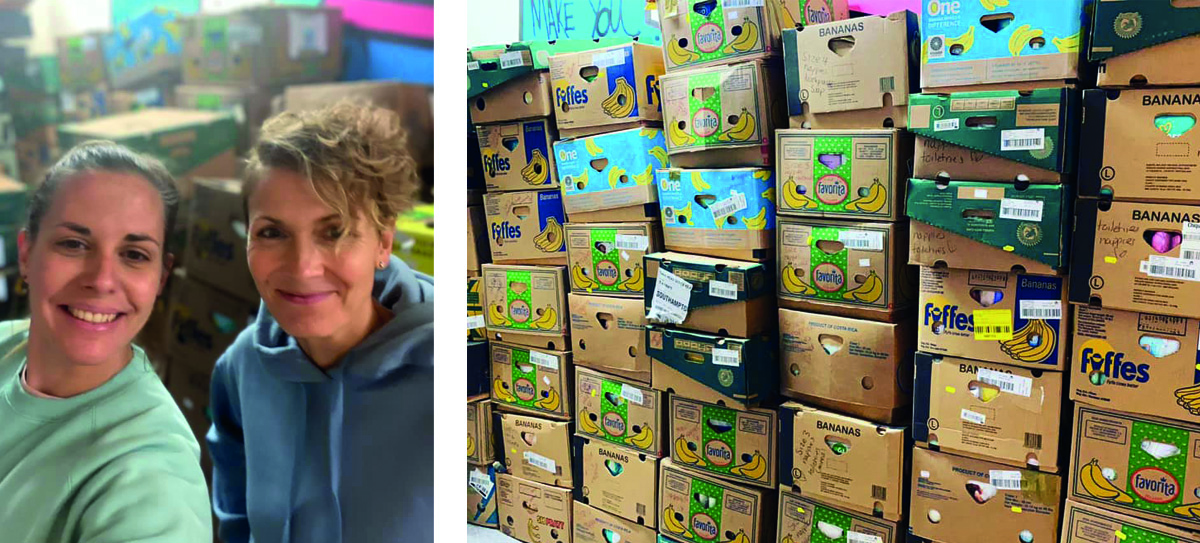
And… what’s next for you?
I am focusing on my family and friends, whilst continuing to run The Red Box Project, as well as exploring ways to continue the work of Portsmouth Cares. I am keen to work more on researching gender inequality and exploring routes into working with young people within this area. Access to education is a fundamental human right and is something I will always continue to fight for.
I feel that my life is a privileged one. I have the freedom to speak, to travel, to educate myself as my children do too. I am loved and supported by my family and have the comfort of knowing I have a place to call home. It is luck of the draw, how you arrive on this planet and we have a duty to look outside of our own existence and to place ourselves in other people's shoes.”
With enormous thanks to Anna, for taking the time to talk to Chorus. We’re sure you’ve had a wealth of more prestigious media engagements over the last few weeks! On behalf of everyone at Mayville, we are exceptionally proud, not only of the recognition that your voluntary work has received, but in how your actions exemplify the school’s ethos and values, for our pupils and, indeed, the whole community.
Use the links below, to find out more about the work of The Red Box Project:
The Red Box Project website
Facebook
Twitter
Instagram
And you can keep up-to-date with Portsmouth Cares on their Facebook page
Share this Post

